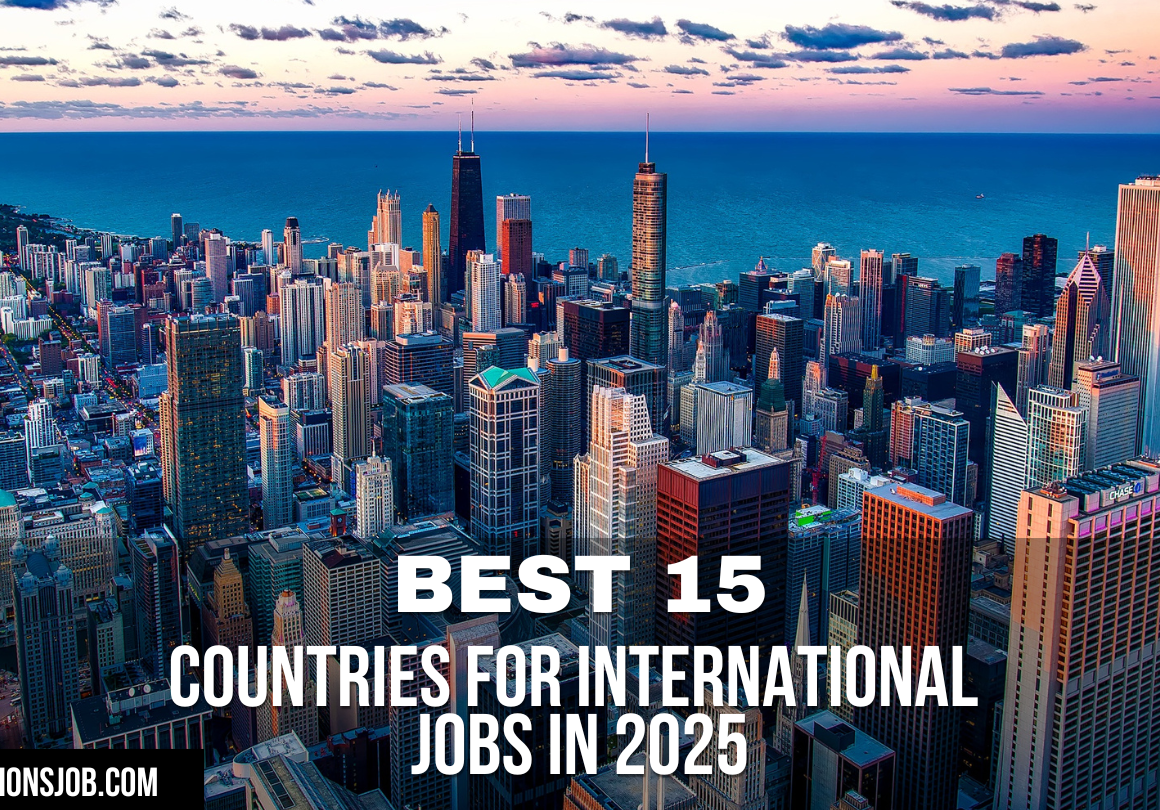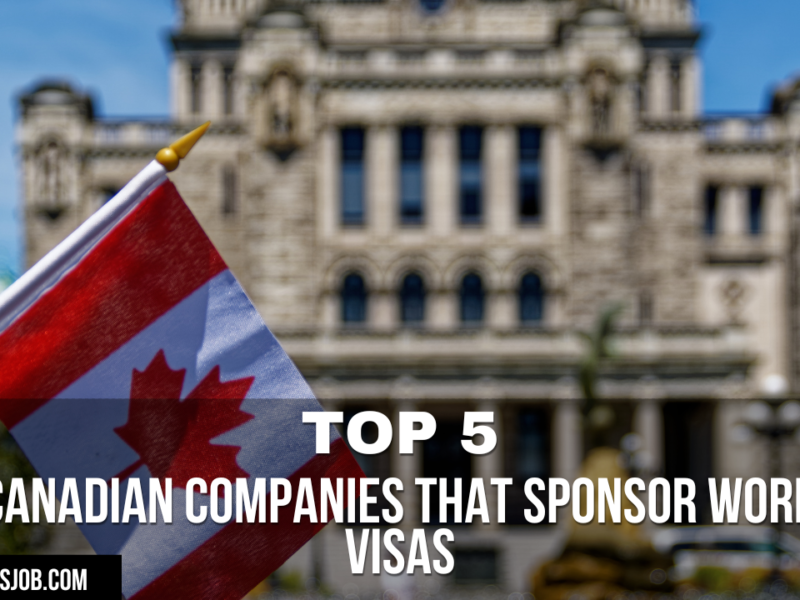Table of Contents Show
In an increasingly globalized world, many professionals seek opportunities abroad for better salaries, career growth, and improved quality of life. Choosing the right country for international work is crucial, as it affects your earnings, lifestyle, work culture, and long-term prospects. This comprehensive guide explores the best 15 countries for international jobs in 2025, analyzing key factors such as salaries, benefits, cost of living, visa pathways, and overall quality of life.
Whether you’re looking for high-paying roles, work-life balance, or a fast track to permanent residency, this guide will help you make an informed decision.
Best 15 Countries for International Jobs in 2025
1. United States
Why Work in the USA?
The United States remains a top destination for international job seekers due to its vast job market, high salaries, and strong economy. With major industries in technology, healthcare, finance, and engineering, professionals can find lucrative opportunities across various fields.
Pros & Cons
Pros:
- High salaries and strong job market
- Access to top-tier companies (Google, Apple, Amazon, etc.)
- Strong economy and career advancement opportunities
- Wide range of industries and job opportunities
- Multicultural environment and networking potential
Cons:
- High cost of living in major cities
- Complex immigration process
- Work-life balance can be challenging in certain industries
Weather Conditions
The USA has diverse climates, from cold winters in the Northeast to warm and sunny conditions in the South and West. States like California and Florida offer mild weather year-round, making them attractive for expats.
Salaries & Benefits
The U.S. offers some of the highest salaries globally, with an average income of $55,000 – $120,000 per year depending on the industry.
- Tech & Engineering: $100,000 – $150,000
- Healthcare: $80,000 – $200,000
- Finance: $75,000 – $150,000
Benefits vary by employer but often include health insurance, retirement plans, and paid leave.
Culture
The U.S. work culture values innovation, productivity, and networking. While some industries demand long hours, others emphasize flexibility and work-life balance. The country is also known for its entrepreneurial spirit.
Cost of Living
Living costs depend on location. Cities like New York, San Francisco, and Los Angeles are expensive, while states like Texas and Florida offer more affordable options. Average rent in major cities ranges from $1,500 to $3,500 per month.
Quality of Life
The U.S. ranks high for quality of life, with access to world-class healthcare, education, and entertainment. However, factors such as healthcare costs and housing affordability can vary.
Pathways to Permanent Residency
- H-1B Visa (for skilled workers, requires employer sponsorship)
- EB-2 and EB-3 Green Cards (employment-based residency)
- EB-5 Investor Visa (for entrepreneurs investing in U.S. businesses)
- Family Sponsorship (for those with relatives in the U.S.)
Social & Financial Diversity
The U.S. is home to diverse cultures, making it easy for expats to integrate. Financial opportunities are abundant, with options to start businesses, invest, and grow wealth.
Final Verdict: Why Choose the USA?
If you’re looking for high salaries, career growth, and access to global corporations, the USA is a top contender. While immigration challenges exist, the rewards make it a top destination for international professionals.
2. Canada
Why Work in Canada?
Canada is one of the most immigrant-friendly countries, offering excellent job opportunities, high salaries, and a strong social system. With an expanding labor market and demand for skilled workers, Canada is a top choice for international job seekers.
Pros & Cons
Pros:
- Straightforward immigration process
- High quality of life and free healthcare
- Strong job market for skilled professionals
- Work-life balance and job security
- Multicultural society
Cons:
- Harsh winters in many regions
- High taxes compared to some countries
- Expensive housing in major cities
Weather Conditions
Canada experiences cold winters, especially in cities like Toronto, Montreal, and Calgary. However, regions like Vancouver have milder, more temperate climates.
Salaries & Benefits
- Tech & Engineering: $80,000 – $120,000
- Healthcare: $75,000 – $180,000
- Finance: $70,000 – $130,000
Canada offers universal healthcare and strong employee benefits, including generous parental leave and retirement plans.
Culture
Canadian work culture emphasizes inclusivity, teamwork, and a good work-life balance. The country has a welcoming environment for expats and a high standard of living.
Cost of Living
Major cities like Toronto and Vancouver are expensive, with rent averaging $1,800 – $3,000 per month. However, smaller cities offer more affordable living.
Quality of Life
Canada consistently ranks as one of the best countries for quality of life due to its healthcare system, education, and clean environment.
Pathways to Permanent Residency
- Express Entry System (for skilled workers)
- Provincial Nominee Programs (PNP)
- Canadian Experience Class (for those with Canadian work experience)
- Family Sponsorship
Social & Financial Diversity
Canada’s financial system is stable, and the country is known for its high social standards and inclusivity.
Final Verdict: Why Choose Canada?
If you’re seeking job security, work-life balance, and an easy immigration process, Canada is one of the best choices for international workers.
3. Germany
Why Work in Germany?
Germany is Europe’s economic powerhouse, offering excellent job opportunities, a strong social system, and a high standard of living. The country has a significant demand for skilled professionals in engineering, IT, healthcare, and manufacturing.
Pros & Cons
Pros:
- Strong economy and job security
- Free healthcare and education
- Work-life balance and labor protections
- Central location in Europe
- Relatively affordable compared to other EU countries
Cons:
- Language barrier (German proficiency is often required)
- Bureaucratic processes can be slow
- High taxes compared to some countries
Weather Conditions
Germany has a temperate climate with cold winters and mild summers. The weather varies by region, with more rainfall in the west and colder temperatures in the east.
Salaries & Benefits
- Engineering & IT: $70,000 – $110,000
- Healthcare: $60,000 – $150,000
- Finance: $65,000 – $120,000
Germany provides free healthcare, strong social benefits, and generous vacation policies.
Pathways to Permanent Residency
- EU Blue Card (for high-skilled professionals)
- German Skilled Immigration Act (for non-EU skilled workers)
- Permanent Residency after 33 months (for EU Blue Card holders)
Final Verdict: Why Choose Germany?
Germany is ideal for skilled professionals seeking job security, social benefits, and a strong economy.
4. Australia
Why Work in Australia?
Australia is known for its strong economy, high quality of life, and excellent job opportunities in industries such as healthcare, engineering, IT, and construction. It offers a great work-life balance, making it a top choice for international job seekers.
Pros & Cons
Pros:
- High wages and excellent working conditions
- Strong demand for skilled workers
- Warm climate and beautiful environment
- Easy immigration pathways
- Strong labor protections
Cons:
- High cost of living in major cities
- Expensive housing market
- Limited public transport in some areas
Weather Conditions
Australia has a mostly warm climate, with mild winters and hot summers. Coastal cities like Sydney and Melbourne experience moderate temperatures, while central regions can be extremely hot.
Salaries & Benefits
- IT & Engineering: $80,000 – $130,000
- Healthcare: $85,000 – $200,000
- Construction: $70,000 – $120,000
Australia offers strong employee benefits, including high wages, generous vacation policies, and an excellent healthcare system.
Pathways to Permanent Residency
- Skilled Independent Visa (Subclass 189)
- Skilled Nominated Visa (Subclass 190)
- Temporary Skill Shortage Visa (Subclass 482)
- Employer Nomination Scheme (Subclass 186)
Final Verdict: Why Choose Australia?
Australia is an excellent destination for professionals seeking high salaries, a strong economy, and an exceptional quality of life.
5. United Kingdom
Why Work in the UK?
The United Kingdom remains a top choice for international job seekers due to its diverse job market, high salaries, and strong financial and tech sectors. The country also offers a rich cultural experience and an established professional network, making it an attractive destination.
Pros & Cons
Pros:
- Strong economy and global job opportunities
- Competitive salaries in finance, IT, and healthcare
- Rich cultural diversity and professional networking
- Good healthcare and social benefits
- Easier access to Europe for business opportunities
Cons:
- High cost of living in London and other major cities
- Competitive job market
- Uncertainty due to Brexit-related policies
Weather Conditions
The UK has a temperate maritime climate, characterized by mild summers and cool, wet winters. Rain is common year-round, especially in cities like London and Manchester.
Salaries & Benefits
- Finance & Banking: £50,000 – £120,000
- IT & Engineering: £45,000 – £100,000
- Healthcare: £40,000 – £90,000
The UK offers strong employee benefits, including the National Health Service (NHS), paid leave, and pension schemes.
Cost of Living
Living costs in the UK vary by location. London is expensive, with rent averaging £1,500 – £3,000 per month, while cities like Manchester and Birmingham offer more affordable options.
Quality of Life
The UK provides a high quality of life, with access to excellent healthcare, education, and cultural experiences. However, work-life balance can be challenging in certain industries.
Pathways to Permanent Residency
- Skilled Worker Visa (for sponsored employees)
- Global Talent Visa (for highly skilled professionals)
- Innovator Visa (for entrepreneurs)
- Indefinite Leave to Remain (after 5 years of residence)
Final Verdict: Why Choose the UK?
The UK is an excellent choice for professionals seeking high salaries, career growth, and access to a global job market. While the cost of living can be high, the opportunities and social benefits make it worthwhile.
6. United Arab Emirates (UAE)
Why Work in the UAE?
The UAE, particularly Dubai and Abu Dhabi, is known for its tax-free salaries, booming economy, and vast job opportunities. It is a hub for finance, technology, hospitality, and construction industries, attracting professionals from all over the world.
Pros & Cons
Pros:
- Tax-free income and high salaries
- Thriving job market in finance, technology, and construction
- Modern infrastructure and world-class amenities
- Safe environment with low crime rates
- Diverse expatriate community and networking opportunities
Cons:
- Extreme summer heat, reaching over 45°C (113°F)
- Expensive housing and high cost of living in major cities
- Strict laws and cultural adjustments required for expatriates
- Limited pathways to permanent residency
Weather Conditions
The UAE has a desert climate, with extremely hot summers and mild winters. The summer months (June to September) see temperatures soaring above 45°C, while winter (November to March) offers pleasant weather averaging 18-26°C.
Salaries & Benefits
- Finance & Banking: AED 200,000 – AED 600,000 per year
- IT & Engineering: AED 180,000 – AED 500,000 per year
- Healthcare: AED 150,000 – AED 450,000 per year
Employees often receive benefits like housing allowances, health insurance, and annual flight tickets home as part of their compensation packages.
Cost of Living
Dubai and Abu Dhabi have a high cost of living, with rent being the biggest expense. A one-bedroom apartment in a prime location costs AED 7,000 – AED 15,000 per month.
Quality of Life
The UAE offers a luxurious lifestyle, top-tier healthcare, and a multicultural environment. However, work-life balance can be challenging due to long working hours in some industries.
Pathways to Permanent Residency
- UAE Golden Visa (for investors, entrepreneurs, and highly skilled professionals)
- Employment-based residence permits (renewable but not permanent)
Final Verdict: Why Choose the UAE?
The UAE is perfect for professionals looking for tax-free high salaries, luxurious living, and a strong job market. However, permanent residency options remain limited.
Switzerland
Why Work in Switzerland?
Switzerland consistently ranks among the best countries for international professionals due to its high wages, strong economy, and excellent quality of life. It is home to global financial institutions, pharmaceutical companies, and high-tech industries.
Pros & Cons
Pros:
- High salaries and strong purchasing power
- Excellent healthcare and public services
- Safe and stable political environment
- Multilingual work environment (English, German, French, Italian)
- Strong financial and banking sector opportunities
Cons:
- High cost of living, especially in cities like Zurich and Geneva
- Competitive job market requiring specialized skills
- Strict immigration policies and work permit restrictions
Weather Conditions
Switzerland has a temperate climate with cold winters and mild summers. Mountainous regions experience heavy snowfall, making it a paradise for winter sports enthusiasts.
Salaries & Benefits
- Banking & Finance: CHF 100,000 – CHF 200,000 per year
- IT & Engineering: CHF 90,000 – CHF 160,000 per year
- Healthcare: CHF 80,000 – CHF 150,000 per year
Swiss employees enjoy generous benefits, including social security, health insurance, and paid leave.
Cost of Living
Switzerland has one of the highest costs of living globally. Rent in Zurich and Geneva can range from CHF 2,000 – CHF 5,000 per month for a one-bedroom apartment. However, high salaries help offset these costs.
Quality of Life
Switzerland ranks among the best countries for quality of life, with clean cities, low crime rates, and excellent public transportation. Outdoor activities, from skiing to hiking, enhance the work-life balance.
Pathways to Permanent Residency
- B Permit (Temporary Residence) for professionals
- C Permit (Permanent Residency) after 5-10 years
- Swiss Citizenship after 10 years of residency
Final Verdict: Why Choose Switzerland?
Switzerland is a top choice for professionals looking for high salaries, economic stability, and an exceptional quality of life. However, it requires careful financial planning due to its high cost of living.
8. Singapore
Why Work in Singapore?
Singapore is a major financial and technological hub in Asia, known for its strong economy, political stability, and excellent job opportunities. The country attracts skilled professionals in banking, IT, engineering, and healthcare.
Pros & Cons
Pros:
- High salaries with low taxes
- Business-friendly environment
- High demand for skilled workers
- Efficient public transport and modern infrastructure
- Safe and clean city with low crime rates
Cons:
- High cost of living, especially housing
- Competitive job market
- Fast-paced work culture with long hours
Weather Conditions
Singapore has a tropical climate, characterized by high humidity, heavy rainfall, and warm temperatures throughout the year, averaging 25–32°C (77–90°F).
Salaries & Benefits
- Finance & Banking: SGD 80,000 – SGD 200,000 per year
- IT & Engineering: SGD 70,000 – SGD 180,000 per year
- Healthcare: SGD 60,000 – SGD 150,000 per year
Singapore offers attractive benefits, including employer-sponsored healthcare, bonuses, and retirement savings through the Central Provident Fund (CPF).
Cost of Living
Singapore is one of the most expensive cities in the world. Rent for a one-bedroom apartment in the city center ranges from SGD 3,000 – SGD 6,000 per month. However, public transport and food options can be affordable.
Quality of Life
Singapore provides an excellent quality of life with world-class healthcare, top-tier education, and a well-developed infrastructure. The city is highly walkable and has extensive green spaces, making it one of the most livable places in Asia.
Pathways to Permanent Residency
- Employment Pass holders can apply for Permanent Residency (PR) after working for several years.
- The Global Investor Program allows high-net-worth individuals to obtain PR through business investments.
- PR status can eventually lead to Singaporean citizenship.
Final Verdict: Why Choose Singapore?
Singapore is an ideal destination for professionals seeking high salaries, a stable economy, and a thriving business environment. While the cost of living is high, the career opportunities and quality of life make it worthwhile.
9. Japan
Why Work in Japan?
Japan is a global leader in technology, automotive, and engineering industries, offering numerous job opportunities for skilled professionals. It is known for its strong economy, high-quality infrastructure, and excellent work ethic.
Pros & Cons
Pros:
- Strong economy with high demand for skilled workers
- Competitive salaries, especially in IT, finance, and engineering
- Safe and clean environment
- Excellent public transportation system
- Rich cultural heritage and vibrant city life
Cons:
- High cost of living in major cities
- Work culture can be demanding with long hours
- Language barrier for non-Japanese speakers
Weather Conditions
Japan has four distinct seasons. Summers are hot and humid, while winters can be cold, especially in northern regions. Spring and autumn offer mild and pleasant weather.
Salaries & Benefits
- IT & Software Development: JPY 5,000,000 – JPY 12,000,000 per year
- Engineering & Manufacturing: JPY 4,500,000 – JPY 10,000,000 per year
- Finance & Banking: JPY 6,000,000 – JPY 15,000,000 per year
Japan offers strong employee benefits, including health insurance, pension contributions, and performance-based bonuses.
Cost of Living
Japan’s cost of living varies by city. Tokyo and Osaka are expensive, with rent for a one-bedroom apartment in central Tokyo averaging JPY 150,000 – JPY 300,000 per month. However, suburban areas offer more affordable options.
Quality of Life
Japan offers a high quality of life with top-notch healthcare, excellent education, and a low crime rate. Its public transport system is among the best in the world, making commuting easy.
Pathways to Permanent Residency
- Work Visa holders can apply for Permanent Residency (PR) after 10 years (or 3–5 years for highly skilled professionals).
- The Highly Skilled Professional Visa offers a fast-track PR option for qualified individuals.
- PR holders can eventually apply for Japanese citizenship.
Final Verdict: Why Choose Japan?
Japan is an excellent destination for professionals seeking career growth, high salaries, and a technologically advanced work environment. While work culture may be intense, the benefits and opportunities make it a compelling choice.
10. Netherlands
Why Work in the Netherlands?
The Netherlands is one of the best European countries for international professionals due to its strong economy, business-friendly environment, and high quality of life. It is a hub for industries like technology, finance, and engineering.
Pros & Cons
Pros:
- Competitive salaries and strong job market
- High English proficiency, making it easy for expats
- Strong social benefits and work-life balance
- Excellent public transportation and infrastructure
- Welcoming and diverse culture
Cons:
- High cost of living, especially in Amsterdam
- Weather can be unpredictable and rainy
- Housing shortages in major cities
Weather Conditions
The Netherlands has a temperate maritime climate, with mild summers (17–20°C) and cool, wet winters (2–6°C). Rain is frequent throughout the year.
Salaries & Benefits
- IT & Software Development: €45,000 – €90,000 per year
- Engineering & Manufacturing: €40,000 – €85,000 per year
- Finance & Banking: €50,000 – €100,000 per year
The country offers strong employee benefits, including paid parental leave, healthcare, and pension contributions.
Cost of Living
Amsterdam is the most expensive city, with rent for a one-bedroom apartment ranging from €1,500 – €2,500 per month. Other cities like Rotterdam and Eindhoven offer more affordable options.
Quality of Life
The Netherlands ranks high in work-life balance, safety, and healthcare. Its biking culture and efficient public transport make commuting easy and affordable.
Pathways to Permanent Residency
- Skilled workers can apply for Permanent Residency (PR) after 5 years of legal residence.
- The Highly Skilled Migrant Visa allows professionals to live and work easily.
- PR holders can eventually apply for Dutch citizenship.
Final Verdict: Why Choose the Netherlands?
The Netherlands is ideal for professionals seeking high salaries, strong work-life balance, and a welcoming culture. While living costs can be high, the job opportunities and social benefits make it a top choice.
11. Sweden
Why Work in Sweden?
Sweden is known for its strong economy, progressive work culture, and excellent social benefits. The country offers opportunities in IT, engineering, healthcare, and research.
Pros & Cons
Pros:
- Strong focus on work-life balance
- High-quality healthcare and education
- Excellent maternity and paternity leave policies
- Strong tech and innovation sector
- Beautiful natural environment and sustainable living
Cons:
- High taxes (but well-distributed benefits)
- Long, dark winters with cold temperatures
- Learning Swedish can be beneficial for long-term success
Weather Conditions
Sweden has a cold Nordic climate, with winter temperatures often dropping below -5°C. Summers are mild, averaging 18–25°C, with long daylight hours.
Salaries & Benefits
- IT & Software Development: SEK 450,000 – SEK 900,000 per year
- Engineering & Manufacturing: SEK 400,000 – SEK 850,000 per year
- Healthcare & Medicine: SEK 500,000 – SEK 1,000,000 per year
Employees enjoy paid vacations, parental leave, and free healthcare.
Cost of Living
Stockholm is the most expensive city, with rent for a one-bedroom apartment averaging SEK 12,000 – SEK 18,000 per month. Other cities like Gothenburg and Malmö offer more affordable housing.
Pathways to Permanent Residency
- Skilled workers can apply for permanent residency after 4 years of continuous work.
- After 5 years of residence, individuals can apply for Swedish citizenship.
Final Verdict: Why Choose Sweden?
Sweden is ideal for professionals seeking work-life balance, strong social benefits, and career growth in a stable economy.
12. Denmark
Why Work in Denmark?
Denmark is known for its high salaries, excellent work-life balance, and strong social welfare system. The country attracts professionals in IT, healthcare, engineering, and renewable energy.
Pros & Cons
Pros:
- Strong focus on work-life balance
- High salaries and excellent social benefits
- Free healthcare and education
- Strong economy and job security
- Green and sustainable cities
Cons:
- High taxes (but well-utilized in public services)
- Cold winters and limited daylight in winter
- Danish language can be challenging for newcomers
Weather Conditions
Denmark has a temperate maritime climate, with cold winters (0–5°C) and mild summers (15–25°C). Rainfall is common throughout the year.
Salaries & Benefits
- IT & Software Development: DKK 450,000 – DKK 800,000 per year
- Engineering & Manufacturing: DKK 400,000 – DKK 750,000 per year
- Healthcare & Medicine: DKK 500,000 – DKK 900,000 per year
Cost of Living
Copenhagen is the most expensive city, with rent for a one-bedroom apartment averaging DKK 10,000 – DKK 15,000 per month. Smaller cities offer more affordable living options.
Pathways to Permanent Residency
- Skilled workers can apply for permanent residency after 4–8 years.
- Citizenship is available after 9 years of residence.
Final Verdict: Why Choose Denmark?
Denmark is ideal for professionals seeking a strong welfare system, job security, and work-life balance.
13. Norway
Why Work in Norway?
Norway is one of the wealthiest countries in the world, known for its high salaries, exceptional work-life balance, and strong welfare system. It has a high demand for skilled workers in oil & gas, IT, engineering, healthcare, and maritime industries.
Pros & Cons
Pros:
- Extremely high salaries and benefits
- Strong labor protections and job security
- Free healthcare and education
- Stunning natural landscapes and outdoor lifestyle
- Strong emphasis on work-life balance
Cons:
- High cost of living, especially in cities like Oslo
- Long, dark winters with limited daylight
- Learning Norwegian is beneficial for long-term career prospects
Weather Conditions
Norway has a cold Nordic climate, with long, dark winters and short, mild summers. Coastal areas experience milder temperatures due to the Gulf Stream.
Salaries & Benefits
- IT & Software Development: NOK 600,000 – NOK 1,000,000 per year
- Engineering & Energy: NOK 700,000 – NOK 1,200,000 per year
- Healthcare & Medicine: NOK 600,000 – NOK 1,100,000 per year
Cost of Living
Norway has a high cost of living, with rent for a one-bedroom apartment in Oslo ranging from NOK 12,000 – NOK 18,000 per month. However, salaries generally compensate for this.
Pathways to Permanent Residency
- Skilled workers can apply for permanent residency after 3 years.
- Citizenship is available after 7 years of residence.
Final Verdict: Why Choose Norway?
Norway is an excellent choice for professionals seeking high salaries, job security, and an exceptional quality of life. While the cost of living is high, the strong economy and social benefits make it a top destination.
14. New Zealand
Why Work in New Zealand?
New Zealand is a top destination for international professionals due to its high quality of life, work-life balance, and strong economy. It is particularly attractive for those in healthcare, IT, engineering, and agriculture.
Pros & Cons
Pros:
- High demand for skilled workers
- Relaxed work culture and excellent work-life balance
- Stunning natural landscapes and outdoor activities
- Safe and welcoming environment
- Pathways to permanent residency
Cons:
- Salaries are lower compared to other top countries
- High cost of living in major cities
- Geographical isolation can make travel expensive
Weather Conditions
New Zealand has a temperate maritime climate, with mild summers (20–30°C) and cool winters (5–15°C). The country experiences significant rainfall but has plenty of sunshine as well.
Salaries & Benefits
- IT & Software Development: NZD 80,000 – NZD 120,000 per year
- Healthcare & Medicine: NZD 90,000 – NZD 150,000 per year
- Engineering & Construction: NZD 85,000 – NZD 130,000 per year
Cost of Living
The cost of living in cities like Auckland and Wellington is high, with rent for a one-bedroom apartment ranging from NZD 2,000 – NZD 3,000 per month. However, smaller cities and rural areas offer more affordable options.
Pathways to Permanent Residency
- Skilled workers can apply for residency through the Skilled Migrant Category.
- After 2 years of residence, permanent residency can be granted.
- Citizenship is available after 5 years of residence.
Final Verdict: Why Choose New Zealand?
New Zealand is perfect for professionals seeking a high quality of life, career stability, and a relaxed lifestyle. While salaries may not be the highest, the overall work-life balance makes it a top destination.
15. Luxembourg
Why Work in Luxembourg?
Luxembourg is one of the smallest yet wealthiest countries in Europe, known for its strong financial sector, high salaries, and excellent work-life balance. It offers opportunities in banking, finance, IT, and EU-related institutions.
Pros & Cons
Pros:
- One of the highest average salaries in Europe
- Strong financial and technology sectors
- Excellent healthcare and social security
- Multicultural work environment
- Low unemployment rate
Cons:
- High cost of living
- Competitive job market requiring specialized skills
- Limited housing availability
Weather Conditions
Luxembourg has an oceanic climate, with mild summers (17–27°C) and cool winters (-2–8°C). Rainfall is common year-round.
Salaries & Benefits
- Finance & Banking: €80,000 – €150,000 per year
- IT & Software Development: €70,000 – €120,000 per year
- Engineering & Consulting: €65,000 – €110,000 per year
Cost of Living
Luxembourg has a high cost of living, especially in housing, with rent for a one-bedroom apartment in the city center ranging from €1,800 – €2,500 per month.
Pathways to Permanent Residency
- Skilled workers can apply for a long-term residence permit after 5 years of continuous work.
- Citizenship is available after 7 years of residence.
Final Verdict: Why Choose Luxembourg?
Luxembourg is ideal for professionals looking for high salaries, career growth in finance or tech, and a strong work-life balance. While living costs are high, the benefits and opportunities make it one of the best destinations for international workers.
Conclusion
Finding the best country for international work depends on a variety of factors, including career prospects, salaries, work-life balance, cost of living, and residency options. The 15 countries discussed in this guide offer excellent opportunities for professionals in different industries.
- If you prioritize high salaries, consider Switzerland, Luxembourg, or the UAE.
- For those seeking strong social benefits and work-life balance, Sweden, Denmark, and Norway are top choices.
- If career growth and innovation are key, the USA, Germany, and Singapore stand out.
- For a simpler immigration process and long-term residency, Canada, Australia, and New Zealand offer great pathways.
Ultimately, the right choice depends on your professional background, financial goals, and lifestyle preferences. By carefully evaluating the factors covered in this guide, you can confidently take the next step in your international career.
Frequently Asked Questions on Best 15 countries for international jobs
1. Best Country for Job Opportunities in Europe?
Germany is widely regarded as the best country for job opportunities in Europe due to its strong economy, demand for skilled professionals, and relatively easy work visa process. The Netherlands and Switzerland are also excellent choices, offering high salaries and strong job markets.
2. Which Countries Have High Salaries and Low Cost of Living?
Countries like the UAE and Luxembourg offer high salaries with low or no income tax. Portugal and Poland also provide a good balance of decent wages with a lower cost of living compared to Western European nations.
3. What Are the Top 10 Highest Salary Countries in the World?
Based on average annual salaries, the highest-paying countries are:
- Switzerland
- Luxembourg
- United States
- Norway
- Denmark
- Singapore
- UAE
- Germany
- Australia
- Netherlands
4. Which Country Has the Most Job Opportunities for Foreigners in 2025?
The United States, Canada, Germany, and Australia have the most job openings for international workers due to skills shortages in various sectors, such as technology, healthcare, and engineering. Canada and Australia, in particular, offer easier immigration pathways for foreign professionals.






